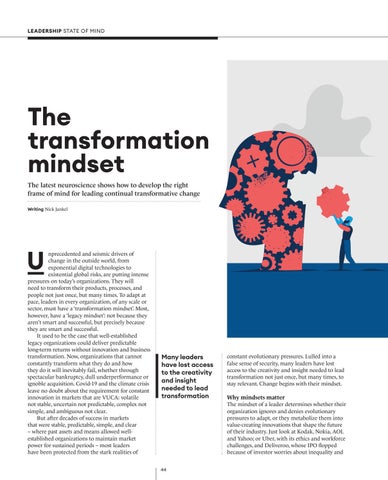LEADERSHIP STATE OF MIND
The transformation mindset The latest neuroscience shows how to develop the right frame of mind for leading continual transformative change Writing Nick Jankel
U
nprecedented and seismic drivers of change in the outside world, from exponential digital technologies to existential global risks, are putting intense pressures on today’s organizations. They will need to transform their products, processes, and people not just once, but many times. To adapt at pace, leaders in every organization, of any scale or sector, must have a ‘transformation mindset’. Most, however, have a ‘legacy mindset’: not because they aren’t smart and successful, but precisely because they are smart and successful. It used to be the case that well-established legacy organizations could deliver predictable long-term returns without innovation and business transformation. Now, organizations that cannot constantly transform what they do and how they do it will inevitably fail, whether through spectacular bankruptcy, dull underperformance or ignoble acquisition. Covid-19 and the climate crisis leave no doubt about the requirement for constant innovation in markets that are VUCA: volatile not stable, uncertain not predictable, complex not simple, and ambiguous not clear. But after decades of success in markets that were stable, predictable, simple, and clear – where past assets and means allowed wellestablished organizations to maintain market power for sustained periods – most leaders have been protected from the stark realities of
Many leaders have lost access to the creativity and insight needed to lead transformation
constant evolutionary pressures. Lulled into a false sense of security, many leaders have lost access to the creativity and insight needed to lead transformation not just once, but many times, to stay relevant. Change begins with their mindset.
Why mindsets matter The mindset of a leader determines whether their organization ignores and denies evolutionary pressures to adapt, or they metabolize them into value-creating innovations that shape the future of their industry. Just look at Kodak, Nokia, AOL and Yahoo; or Uber, with its ethics and workforce challenges, and Deliveroo, whose IPO flopped because of investor worries about inequality and
44
